Bangladesh
Famous 'Bangali' include...
Please note: This section is currently being updated. Thank you for your patience.
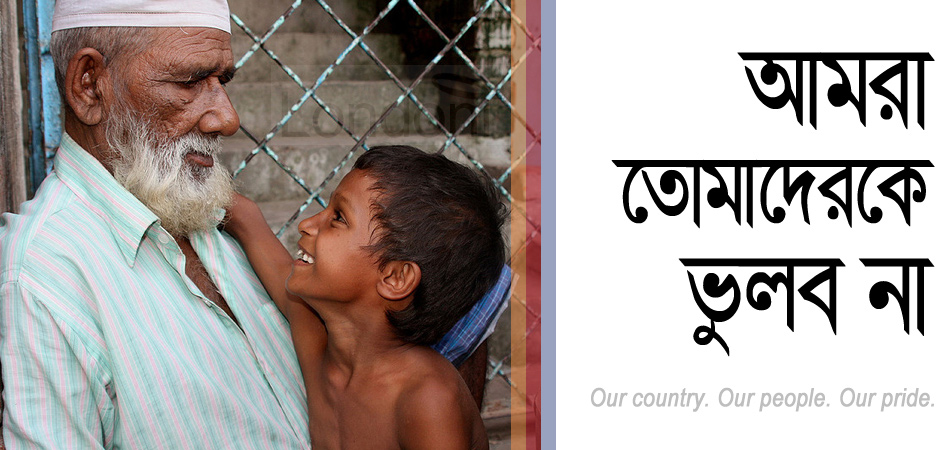
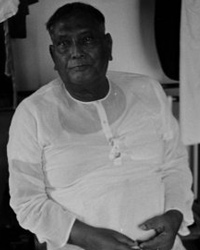
Abul Kashem Fazlul Huq (Sher-e-Bangla)
(26 Oct 1873 - 27 Apr 1962)
Statesman, public leader who held various high political posts including Mayor of Calcutta (1935), Chief Minister of Undivided Bengal (1937 – 1943) and East Bengal (1954), Home Minister of Pakistan (1955) and Governor of East Pakistan (1956 – 58). Born in Saturia, Barisal division, Bangladesh. Only son of Muhammad Wazid, a reputed civil and criminal lawyer of the Barisal Bar, and Saidunnissa Khatun. Grandfather Kazi Akram Ali was a good Arabic and Persian scholar and a prominent muktar of Barisal. Graduated with triple honours in Chemistry, Mathematics and Physics (1894) from Presidency College, MA degree in Mathematics (1896) from University of Calcutta, and Law Degree (1897) from University Law College, Calcutta. Started legal career as apprentice under Sir Asutosh Mukerjee, but returned to Barisal and started legal practice after death of father. Worked as part-time lecturer of Raj Chandra College (1903-1904) and entered government service as a Deputy Magistrate in 1906. Founding member of All India Muslim League at Dhaka on 30 December 1906, and founder of Krishak Praja Party (1935) campaigning for peasant rights. Drafted Lahore Resolution (1940) which ultimately led to new nation of Pakistan. Honorary title of 'Sher-e-Bangla' (The Tiger of Bengal) and lovingly referred to as 'Huq Saheb'. Retired from politics around 1958 and died four years later in Dhaka. Buried alongside Huseyn Shaheed Suhrawardy and Khwaja Nazimuddin at Shahbag in mausoleum known as 'Teen Netar Mazar' (Mausoleum of Three Leaders). Funeral drew crowd of half a million. Throughout Bangladesh, various educational institutions (e.g. Barisal Sher-e-Bangla Medical College), roads, neighborhoods (Sher-e-Bangla Nagar, which houses National Parliament), and stadiums (Sher-e-Bangla Mirpur Stadium) named after him. Islamabad's A.K.M. Fazl-ul-Haq Rd named after him. Married three times: first wife Khurshid Begum with whom he had two daughters, the marriage ended in divorce. Second wife was Musammat Jannatunissa Begum from Howrah, West Bengal, and they had no children. Third wife Khadija from Meerut district, Uttar Pradesh, with whom he had a son, A. K. Faezul Huq, who played an active role in Bangladeshi politics.
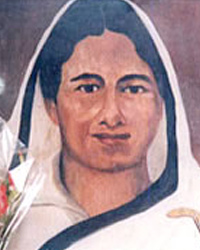
Roquia Sakhawat Hussain (aka Begum Rokeya)
(9 Dec 1880 – 9 Dec 1932)
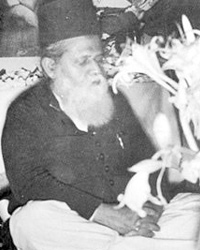
Dr. Muhammad Shahidullah
(1885 – 1969)
Educationist, writer and linguist. A dormitory in University of Dhaka, 'Shahidullah Hall', named after him. Received degree in Sanskrit (1910) from City College, Kolkata, Master of Arts in Comparative Philology (1912) from University of Calcutta, and PhD from Sorbonne University in France. Translated and edited a number of books including Sindabad Saodagarer Galpa (The stories of the merchant Sindbad, 1922), Bhasa O Sahitya (Language and literature, essays, 1931), Bangala Byakaran (Bengali grammar, 1936), Shikwah O Jawab-i-Shikwah (Questions and their answers, translation from Iqbal, 1942), Rubaiyat-i-Omar Khaiyam (Quatrains of Omar Khayyam, translation, 1942), Essays on Islam (1945), Amader Samasya (Our problems, essays, 1949), Padmavati (Volume I ed, 1950), Bangla Sahityer Katha (History of Bengali literature, Volume I in 1953, Volume II in 1965), Bangala Bhasar Itibrtta (History of Bengali language', 1959), and Qur'an Sharif (The Qur'an, 1963). The dictionary of regional dialects was published under his editorship. Translated 'Charyapada', Buddhist mystic songs from 8th-12th century. Formulating rules for the reformed Bengali calendar. Born in of village Peyara, 24 Pargana, West Bengal, but buried in Shahidullah Hall, beside a mosque on the campus of Dhaka University. Has 7 sons and 2 daughters.
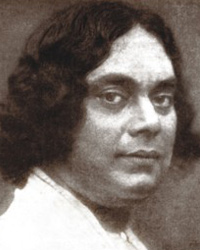
Kazi Nozrul Islam
(24 May 1899 – 29 Aug 1976)
National poet of Bangladesh. Given popular title of 'Bidrohi Kobi' (Rebel Poet). Mixed career including muezzin (caller of prayer) at local mosque, officer in British Indian Army, and journalist in Kolkata. Wrote and composed music for his nearly 4,000 songs (including gramophone records), collectively known as 'Nazrul geeti' (Nazrul songs). Awarded Jagattarini Gold Medal (1945) — highest honour for work in Bengali literature by the University of Calcutta — and Padma Bhushan (1960), one of India's highest civilian honours. Awarded Swadhinata Purushkar, Bangladesh's highest state award, in the first year of the award (1977). At the age of 43 (in 1942) he began suffering from an unknown disease, losing his voice and memory. Born in village of Churulia, West Bengal but died in Dhaka. Married a Hindu woman, Pramila Devi, and had 4 sons (Krishna Mohammad, who died premature, Bulbul, Sabyasachi, and Aniruddha).
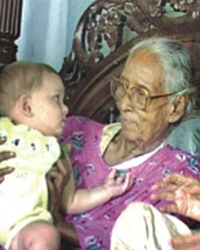
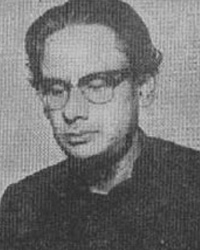
Farrukh Ahmed
(10 Jun 1918 – 19 Oct 1974)
Poet and writer of children's literature. Strong Islamic belief, both in poetry and personal life, thus referred to as poet of Islamic Renaissance. Born in village of Majhail, Sreepur Upazilla, Magura District in Khulna. Father Khan Sahib Syed Hatem Ali was a Police Inspector. Matriculated from Khulna Zilla School (1937) and completed IA from Ripon College, Kolkata (1939). Enrolled at prestigious Scottish Church College to study BA (Hons) in Philosophy and English Literature, but unable to complete studies. Inspired by radical humanism of Manabendra Nath Roy and participated in leftist politics. Served in the office of IG Prisons for a few years and in the Civil Supply Department in Kolkata. Began editing monthly 'Mohammadi' magazine from 1945. After Partition of India in 1947, came to Dhaka and joined Dhaka Centre of Radio Pakistan as a staff artiste where he directed popular weekly programme for children, named 'Khelaghar' (Playhouse). Became famous for his poem 'Lash' written on 1944 famine. Promoted Muslim awakening and utilised Arabic and Persian words greatly in his poem. Also wrote satrical poems and sonnets. Books include Majhi (1944), Sirazam Munira (1952), Naufel O Hatem (1961), Muhurter Kavita (1963), Hatemtayi (1966), and Habida Marur Kahini (1981). Children works include Pakhir Basa (1965), Harafer Chhada (1970), and Chhadar Asar (1970). Winner of first Bangla Academy Award (1960), President's Award for Pride of Performance (1961), Adamjee Prize (1966), UNESCO Prize (1966), Ekushey Padak (posthumously, 1977), and Swadhinata Puraskar (posthumously, 1980). Supported the Pakistan movement. Despite his Pakistani and Islamic ideals, he supported Language Movement in 1952 and, later, Liberation War of Bangladesh. Died in Dhaka without any medical care and in severe penury. Work promoted by Farrukh Gabeshana Foundation.
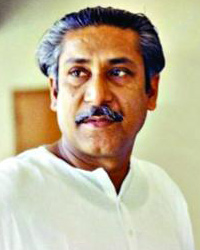
Sheikh Mujibur Rahman
(17 Mar 1920 - 15 Aug 1975)
1st President and 2nd Prime Minister of independent Bangladesh. Leader of Awami League. Popularly referred to as 'Bangabandhu' (Friend of Bengal) and 'Jathir Jonok/Pitha' (Father of Nation). Participated in 1952 Bhasha Andolon. Gave the historic 'Ebarer sangram muktir sangram, ebarer sangram swadhinatar sangram' 7 March 1971 speech in Ramna Racecourse (now Suhrawardy Udyan) to inspire a nation to fight for their right. Imprisoned in (West) Pakistani jail for nine-and-half month during Mukhtijuddho. First Constitution of Bangladesh formulated under his leadership. Won Bangladesh's first general election. Creator of the controversial BAKSAL one-party ruling system. Assassinated along with most of his family by rebel officers on 15 August 1975 at family home in Dhanmondi, Dhaka. Daughter Hasina has become PM of Bangladesh on many occassions. Born and buried in Tangail, Dhaka bibhag.
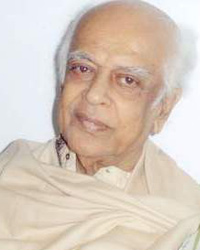
Muzharul Islam
()
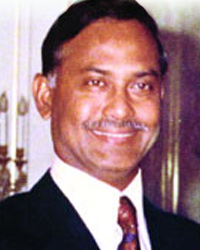
Ziaur Rahman
()

Muhammad Yunus
(Born 28 Jun 1940)
Bangladeshi economist and founder of Grameen Bank which provides microcredit (small loans to poor people). Both Grameen Bank and Muhammad Yunus won Nobel Peace Prize in 2006 - first Bangladeshi and third Bengali to ever get a Nobel Prize. Born in village of Bathua, Chittagong. Third of nine children of Haji Dula Mia Shoudagar and Sufia Khatun. Father was a jeweler, and mother suffered from psychological illness by 1949. Received degree (1960) and masters (1961) in economics from Dhaka University and appointed lecturer in Chittagong College. Received Fulbright Scholarship in 1965 to study in United States and obtained PhD in economics from Vanderbilt University Graduate Program in Economic Development (GPED) in 1971. Assistant professor of economics at Middle Tennessee State University in Murfreesboro (1969 - 1972). Campaigned in US for Bangladesh's liberation in 1971. Returned home and set up various rural economic program while head of Economics department of Chittagong University. Led to formation of Grameen Bank (Village Bank) in 1983. Won countless awards including Swadhinata Purushkar (1987), US Presidential Medal of Freedom (2009), King Abdul Aziz medal (2007), Ramon Magsaysay Award (1984), World Food Prize (1994), and multiple honorary doctorate degrees from universities across the world (e.g. Argentina, Bangladesh, Belgium, Costa Rica, India, Italy, Japan, Lebanon, Malaysia, Russia, South Africa, UK, USA and Peru). Voted 2nd in Prospect Magazine's 2008 global poll of the world's top 100 intellectuals. In January 2008, Houston, Texas declared 14 January as "Muhammad Yunus Day". Embroiled in controversies regarding microfinance and management role within bank. Married a Bengali after first marriage to a Russian-American ended in separation. A daughter from each of the two marriages. Work now carried out by think tank Yunus centre.

Jawed Karim
(Born in 1979)
Founder of YouTube along with Chad Hurley and Steve Chen in 2005. YouTube's first video, Me at the zoo, was uploaded by Karim on April 23, 2005. Many of the core components of PayPal, including its real-time anti-fraud system, were also designed and implemented by Karim. father, Naimul Karim, is a Bangladeshi researcher at 3M. His mother, Christine Karim, is a German scientist and research associate professor of biochemistry at the University of Minnesota. born in Merseburg, East Germany.
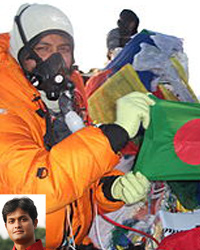
Musa Ibrahim
(Born 1979)
Bangladeshi mountaineer and a journalist by profession. He is the first Bangladeshi to reach the summit of Mount Everest http://www.thedailystar.net/newDesign/news-details.php?nid=140208. According to Musa, he reached the summit around 6:00am BST on May 23, 2010. Bachelor of Education(B.Ed) degree on Science Education and Master of Education(M.Ed) degree on Educational Evaluation and Research from 'Institute of Education and Research (IER), University of Dhaka. degree on Disaster Management from BRAC University, Dhaka. Born in Noakhali.
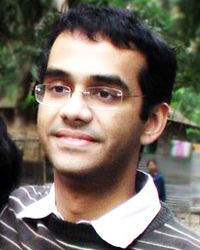
Nafees Bin Zafar
()
First Bangladeshi to win an Oscar for Scientific and Technical Academy Awards in 2007 http://www.oscars.org/awards/scitech/winners/2007.html for the development of the fluid simulation system at Digital Domain, a visual effects and animation company founded by Titanic film director James Cameron amongst others. applying his mad computer skills to digital effects in movies like The Lord of the Rings: The Fellowship of the Ring and Pirates of the Caribbean: At World’s End. develop visual effects software for DreamWorks film studio. His uncle is architect Syed Mainul Hossain, who designed the Jatiyo Smriti Soudha, the national monument of Bangladesh. http://www.nafees.net/
